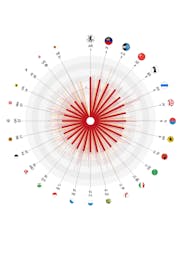Since 2013, Avenir Suisse’s Freedom Index has been comparing the state of freedoms in the cantons on the basis of civil and economic indicators. In this year’s survey there have been substantial shifts: Appenzell-Ausserrhoden is now in first place, and with the exception of Geneva and Valais, the western Swiss cantons have moved up to the upper middle rankings. These movements are due in part to the discontinuation of three indicators. The message is that freedoms have to be regularly re-evaluated.
“Freedom’s just another word for nothing left to lose”: in 1971, this line from a song from American rock icon Janis Joplin was adopted as the motto of an entire generation. In places such as Switzerland, on the other hand, where there is much to lose, freedom is constantly under pressure from all kinds of regulation. This is one of the primary reasons why in 2013, the Avenir Suisse Freedom Index started comparing the varying freedoms within the cantons.
This year sees Canton Appenzell Ausserrhoden heading the rankings for the first time. It takes the place of the Principality of Liechtenstein, which immediately outranked all the Swiss cantons when it was first evaluated last year. Canton Aargau, which led the table for many years, maintained third place in the 2021 index.
Modifications to the Indices
Freedoms can be lost. For them to increase is more of an exception. Some shifts in the rankings in the Avenir Suisse Freedom Index are the result of adjustments in the indices that can be explained by a loss of freedoms at the national level. The “ban on face coverings” index fell victim to the vote in favor of the “burka initiative.” Cantons that in recent years had benefited from a liberal solution lost out. For its part the category for fixed traffic cameras was dropped because the police are increasingly opting for mobile speed traps, making state surveillance more unpredictable. Lastly, the criterion for state investment in residential construction had to be discontinued because the federal office of housing stopped gathering the relevant data in the required form.
The discontinuation of these three indices benefited the cantons of Geneva, Schaffhausen, and Basel-Stadt disproportionately, but put the Principality of Liechtenstein, Glarus, and Appenzell Innerrhoden at a disadvantage.
Ticino and French-speaking Switzerland Play Catch-up
The year’s biggest climbers are the cantons of Ticino and Schaffhausen: Ticino now ranks 8th (vs 20th last year) and Schaffhausen 9th (23rd last year). Valais has also managed to lift itself out of the group at the bottom of the table, advancing from second-last to 18th place. Jura (ranked 7th) and Neuchâtel (12th) held onto their places in the upper middle rankings, while Valais and Geneva are stuck in 26th and 27th place respectively. The biggest losers were the cantons of Obwalden (down to 19th from 12th last year) and Appenzell Innerrhoden (down from 16th to 25th).
While the German-speaking cantons are a nose ahead in terms of the economic sub-index, western Switzerland does better in terms of civil liberties, where the top seven include four French-speaking cantons: Jura (1st in terms of civil liberties), Neuchâtel (3rd), Valais (5th) and Fribourg (7th). All in all, the French-speaking cantons are distributed much more evenly through the Avenir Suisse Freedom Index this year.
The Avenir Suisse Freedom Index is an interactive online publication. For example you can compare cantons, or include or exclude specific indicators to create your own personal freedom index.






